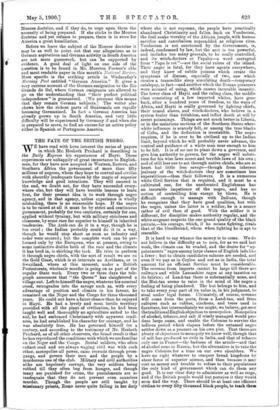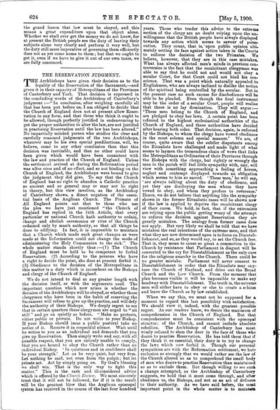THE FATE OF THE BRITISH NEGRO.
WE have read with keen interest the series of papers in which Mr. Hesketh Prichard is describing in the Daily Express his experiences of Hayti. Those experiences are unhappily of great importance to English- men, for they have now accepted in Western, Eastern, and Southern Africa the government of more than fifty millions of negroes, whom they hope to control and civilise with absurdly inadequate forces by the magic of superior knowledge and good intentions. They will succeed in the end, we doubt not, for they have succeeded every- where else, but they will have terrible lessons to learn first, for their present idea is to work through negro agency, and in that agency, unless experience is wholly misleading, there is no reasonable hope. If the negro i6 to be raised at all it must be by strict and continuous government, probably for two centuries, certainly for one, applied without tyranny, but with military strictness and closeness, by some race far superior to himself in inherited tendencies. The Arab can do it in a way, though he is too cruel ; the Indian probably could do it in a way. though he would stop short as soon as industry and order were secured ; but the complete work can be per- formed only by the European, who at present, owing to some instinctive dislike both of the race and the climate it has bred in, is shirking the task. He tries to perform it through negro chiefs, with the sort of result we see on the Gold Coast, which is at intervals an Aceldama, or in Swaziland, where at this moment, under a British Protectorate, wholesale murder is going on as part of the regular State work. Every two or three days the tele- graph announces that "the Queen" has slaughtered a village out. Left to himself the negro, whatever his nominal creed, retrogrades into the savage such as, with every advantage of position and climate in his favour, he remained on the Niger and. the Congo for three thousand years. He could not have a fairer chance than he enjoyed in Hayti. He had a lovely and most fertile territory provided with all the plant of civilisation, he had been taught well and thoroughly an agriculture suited to the soil, he had embraced Christianity with apparent readi- ness, he had established his character for courage, and be was absolutely free. He has governed himself for a century, and according to the testimony of Mr. Hesketh Prichard, as of all other observers, the broad result is that be has reproduced the conditions with which we are familiar on the Niger and the Congo. Brutal soldiers, who often eatmot read, and are always waging civil war with each other, monopolise all power, raise recruits through press- gangs, and govern their men and the people by a murderous use of the club. Military and civil authorities alike are hopelessly corrupt, the very soldiers being robbed till they often beg from hunger, and though many are punished for crime, the punishments are so inadequate that they do not prevent even causeless murder. Though the people are still taught by missionary priests, Rome never quite failing in her duty where she is not supreme, the people have practically abandoned Christianity and fallen back on Voodooism, the foul snake worship of the African jungle, with human sacrifice and cannibalism superadded as religious rites. Voodooism is not sanctioned by the Government, is, indeed, condemned by law, but the sect is too powerful, and includes too many generals, to be really controlled, and its witch-doctors or Papaloi—a word corrupted from "Papa le roi "—are the social rulers of the island. Their anger is fatal, for they have agents everywhere, and they know of subtle poisons which create the symptoms of disease, especially of two, one which creates a trance-like sleep simulating death—temporary catalepsy, in fact—and another which the Roman poisoners were accused of using, which causes incurable insanity. The lower class of Hayti and the ruling class, the middle class consisting of a few imported whites, have gone back, after a hundred years of freedom, to the ways of Africa, and Hayti is really governed by fighting chiefs, their armed slaves, and witch-doctors, who believe in a system fouler than fetishism, and inflict death at will by secret poisonings. Things are not much better in Liberia, or in the malarious sections of the Southern States where white influence is scarcely felt, or among the true blacks of Cuba, and the deduction is irresistible. The negro requires, if he is ever to be civilised up to the Indian limit, beyond which he will probably never advance, the control and guidance of a white man near enough to him to be felt. It is of no use to plant down a governor, and give him authority to govern, for the negro will substi- tute for his wise laws secret and terrible laws of his own ; and of still less use to act through native chiefs, who are at heart but little less savage—though from inherent jealousy of the witch-doctors they are sometimes less superstitious—than their followers. It is a numerous white Civil Service that is required, and it must be a cultivated one, for the uneducated Englishman has an incurable impatience of the negro, and has no notion of controlling him except by blows. He is difficult enough to manage with Indians, though he recognises that they have good qualities, but with the negro, unless the latter is a soldier, he is a source rather of evil than of good. With the soldier it is different, for discipline makes authority regular, and the white sergeant respects the one grand quality of the black private,—his courage, which, if he means fighting, rivals that of the bloodhound, whom when fighting he is apt to resemble.
It is hard to say whence the money is to come. We do not believe in the difficulty as to men, for as we said last week, the climate can be evaded, and the desire for " ap- pointments " rages among large classes of English lads like a fever ; but to obtain candidates salaries are needed, and even if we pay as in Ceylon and not as in India, the total amount for an efficient Service must be considerable. The revenue from imports cannot be large till there are railways and while Lancashire rages at any taxation on its fabrics ; of Land-tax there is substantially none, and the Hut-tax seems to raise in the mind of the negro a, feeling of being plundered. The hut belongs to him, and to take every year part of its value is, in his judgment, to steal under legal forms. Ultimately, of course, revenue will come from the ports, from a. Land-tax, and from cultures such as rubber, cinchona, and trees used in furniture, but intermediately we might, we believe, get over thetraditionalEnglish objection to monopolies. Monopolies of alcohol, tobacco, and salt if wisely managed would pro- duce large sums, and enable the Colonies to survive the tedious period which elapses before the untamed negro settles down as a peasant on his own plot. That there are plenty of objections to monopoly we know well, though that of salt has produced no evils in India, and that of tobacco only one in France—the badness of the article—and that of alcohol none in Russia; but the alternative is to take the negro Colonies for a, time on our own shoulders. We have no right whatever to conquer broad kingdoms by sheer force of superior science, and then because it may cost us money and trouble to refuse to their populations the only kind of government which can do them any good. It. is our clear duty to administer as well as reign, and if the British people would but perceive it they would soon find the way. There should be at least one efficient civilian to every fifty thousand black people, to teach them. the grand lesson that law must be obeyed, and this means a great expenditure upon that object alone. Whether we shall ever get the money we do not know, for at present the British people see the duty of leaving their subjects alone very clearly and perform it very well, but the duty still more imperative of governing them efficiently does not as yet come home to them ; but that we ought to get it, even if we have to give it out of our own taxes, we are fully convinced.







































 Previous page
Previous page